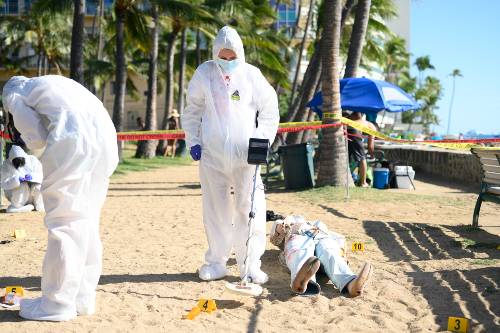International journal accepts paper from Professor David Carter and colleagues
David Carter, Ph.D., literally wrote the book on forensic microbiology so, it was only natural that he was invited to co-author a published paper that will appear in Nature Microbiology. Completely comfortable discussing an issue that is often squeamish for many, the Forensic Sciences Program director casually speaks of cadavers and PMI (Post Mortem Interval) as if he’s talking about the weather.
“There’s definitely increasing interest in PMI (or the time that has elapsed since an individual’s death),” Carter says. “It’s critical information that could be key to solving a crime—or providing an alibi—in absence of any witnesses … or insects.”

The microbiomes associated with decomposing human cadavers are universal regardless of location or environmental conditions, the paper published in Nature Microbiology suggests. The findings show a conserved and predictable sequence of microbial interactions that break down organic matter, which could have implications for forensic science.
Decomposition is essentially nature’s recycling system. It is a fundamental process that recycles dead biological material to fuel biological processes, such as plant productivity and soil respiration. Microbial fungi and bacteria are predominantly responsible for decomposition, and although this process is well studied, research has focused predominantly on the breakdown of dead plant biomass. In contrast to plants, animal carcasses, including those of humans, are enriched in readily decomposable proteins and lipids, but their impact on biogeochemistry and community ecology are poorly understood.
In their research, Carter and his colleagues tracked the decomposition process in 36 human cadavers, which had been willed to science. The bodies were placed in three locations with either a temperate or semi-arid climate, with three cadavers placed at each location for each of the four seasons, and the researchers took samples of the cadavers’ skin and surrounding soil throughout the first 21 days postmortem. Their study found that decomposing human cadavers had a universal consortium of microbes, regardless of the location, climate or season, that are rare in non-decomposition environments and appear unique to the terrestrial breakdown of flesh.
“Jessica Metcalf of Colorado State and Rob Knight of UC San Diego and I initiated this research in 2011,” Cater says. “Our findings are a sign of success, but we’re still not quite there.”
With metagenome-assumed genomes and metabolomic profiling of soils adjacent to cadavers, Carter and his co-authors reconstructed a network of interaction that revealed how fungi and bacteria share resources as they metabolize decomposition products. Carter and his colleagues suggest that insects may serve as vectors that disperse these microbes from one decomposing animal to another.
According to Carter, using data on the microbial timeline of cadaver decomposition, combined with a machine learning model, they were also able to predict the time since death, which could have potential future applications for forensic science.
“We now have techniques that we didn’t have 20 years ago,” Carter asserts. “It’s also a lot easier for new science and other developments to get in the hands of lawyers and investigators, which makes for a stronger working relationship with criminologists to achieve criminal justice.”
















